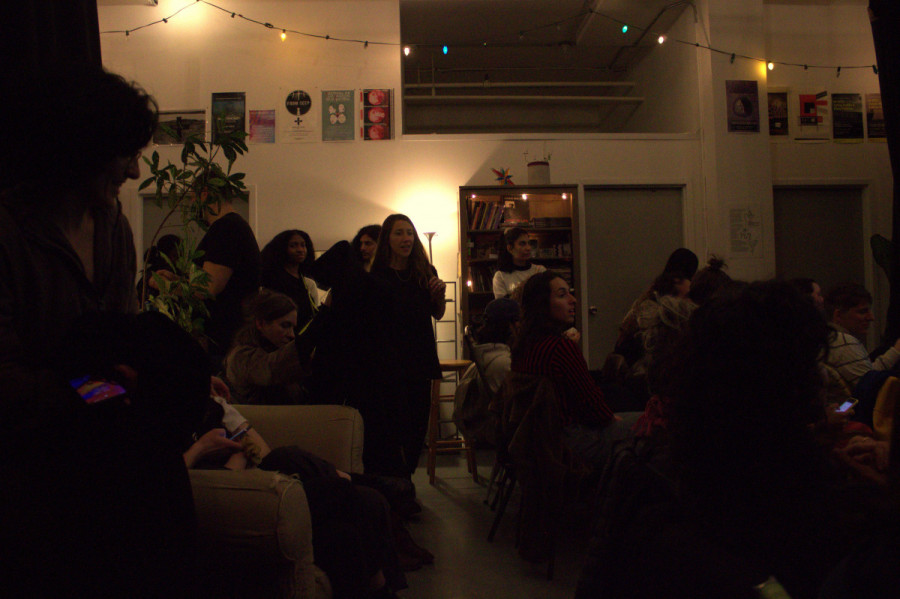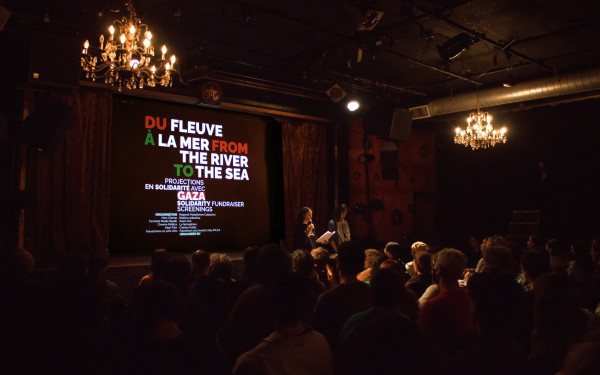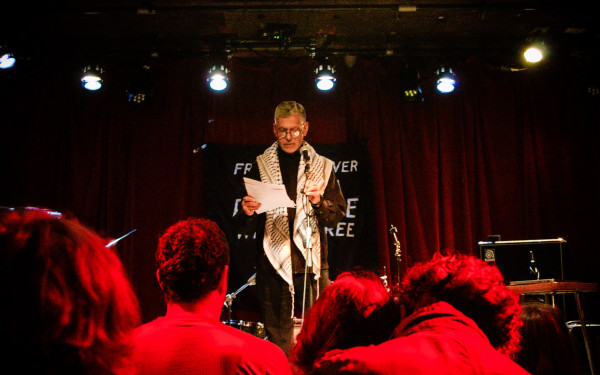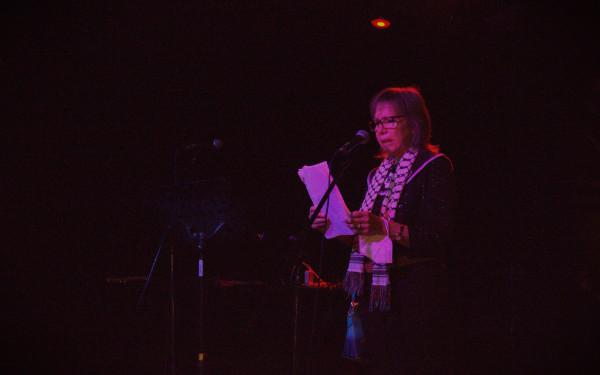Film coalition “From the River To The Sea” premieres with Militant Cinema
Cascade of screenings brings contemporary and historical films into conversation with each other
From Oct. 30 to Dec. 3, various cultural organizations, including Regards Palestiniens Collective, Feminist Media Studio, Dhakira Collective, Hors Champ, and Cinema Politica, collaborated to present Militant Cinema in solidarity with Palestine. La Lumière Collective, an intimate venue, hosted the premiere on Oct. 30, featuring folding chairs, a compact space and greenery.
“From the River to the Sea” premiered with screenings of Militant cinema. It featured films exploring revolutionary and anticolonial themes. The initiative served as a fundraiser in response to the ongoing situation in Palestine, bringing together artists.
The micro-cinema showcases films in original formats, including 16mm, 35mm, and high definition. The event comprised a screening of three films—Filipa Cesar’s Conakry, Oraib Tukan’s Via Dolorosa, and Mohanad Yaqubi’s Off Frame AKA Revolution Until Victory—exploring revolutionary and anticolonial imaginaries, fostering a nuanced dialogue on cinema's role in political emancipation.
Moderated by Feminist Media Studio members Sanaz Sohrabi and Farah Atoui, an open discussion about the movies shown was pitched, and guests—filmmaker and video artist Muhammad Nour ElKhairy, as well as a PhD candidate in film and moving images, studies Fadi AbuNe’meh—were invited to talk. ElKhairy, AbuNe’meh, collective members, and the audience delved into a discussion on cinema's colonial dimensions, the humanitarian gaze, militarism's imagery, and the broader geopolitical context. The topics also included image as a tool, post-colonial decorum, mediation, media, and medium.
Farah Atoui, post-doc fellow in the communications studies department at Concordia University, and member of the Feminist Media Studio, is an independent film programmer. She is part of two screening collectives, Regards Palestiniens, and Regards Syriens, both involved in organizing annual screening series for Palestinian and Syrian films. Atoui explains that this screening, in particular, is part of a series that Sanaz and she are working on together. Their program was conceived way before Oct. 7, and they have two other screenings happening with Feminist Media Studio, independent of the solidarity fundraiser screening.
“In light of what’s happening in Palestine at the moment, we thought about what this screening means, and how we could reframe it as a response to what’s happening,” says Atoui. “This is how we reframed it as a fundraiser. At the same time, Muhammad was part of the collective that I’m part of, and other members of cultural organizations and art collectives of Montreal wanted to do something, so we decided to come together as a coalition and worked on that program with various screenings, and all of them are directed towards fundraising.”
Sanaz Sohrabi, a filmmaker, digital artist, and doctoral candidate in interdisciplinary studies in society and culture at Concordia University, as well as a member of the Feminist Media Studio, discusses the film selection centered around the theme "Resisting Displacement, Displacing Resistance." She provides insight into the framework and the perspectives guiding the screening program. Shaped over four to five months, the film screening's foundation lies in Krysta Lynes' Necessary Feminisms project, initiated during the pandemic and backed by a grant.
“Necessary Feminisms was sort of this grand theme that allowed people like me and Farah to take it as a guarding point and then run with it, and make it our own programming,” says Sohrabi. “As film programmers and filmmakers, our goal is to explore political aesthetics, juxtaposing contemporary and historical films to spark discussions”.
Sohrabi delves into the studio’s focus extending internationally, encompassing artists engaged in resistance from Canada, the US, Iran, India and beyond.

ElKhairy, a Palestinian filmmaker and video artist, emphasized the crucial role of images in conveying the reality of the situation during the open discussion. He highlighted the blackout's dual purpose: inflicting suffering on Gazans and obstructing awareness by preventing people from seeing the events. Muhammad noted that, particularly in places like Montreal, many individuals comprehend the situation primarily through images.
“I think the program really does a great job of helping us think through how we experienced these images,” says Elkhairy. “What does it mean to experience these images as an audience now that there's such a big explosion of images? Images are everywhere and images of violence and suffering are accessible.”
Fadi AbuNe’meh, previously a film teacher at Ramallah Friends School, located in Palestine, explores in his speech the impact of media consumption habits on reactions to images, discussing programmed helplessness and questioning our response to media spectacle. AbuNe’meh examines the historical context, emphasizing the convergence of Muslim and indigenous struggles against imperialism. He urges scrutiny of our tendency to prioritize empathy for children's suffering over men's struggles, emphasizing the need to confront this bias.
Two of the audience members, Baya and Maeve, attended the premiere and reflected on their reason for attending the screening. Maeve attended the solidarity fundraiser screening with the initial goal of discovering new filmmakers and historical moments. The event's shift to a solidarity fundraiser resonated with her values.
“The films and the discussion made me think about the amount of revolutionary and anticolonial archival footage that has been lost or purposefully hidden from view,” said Maeve. “The speakers noted that it is often with great difficulty that footage is able to be reclaimed from colonial archive centers and worked with by filmmakers and artists.”
Baya, of Algerian descent, drew links between Algeria’s revolution and liberation by mentioning how the idea of the humanitarian gaze spoke to her, as well as the importance of approaching knowledge with diversity. She says that the screening reinforced this bond as the audience witnessed struggles against imperialism, showcasing how those seeking freedom readily support other liberation movements, such as the Palestinian one.
“We often discuss intersectionality in addressing oppression, but its true meaning can be overlooked,” says Baya. “In this case, my people have consistently supported the Palestinian cause, reciprocating the love Palestinians have shown us. The Algerian revolution taught us lessons applicable to other liberation movements, reiterating the connection between oppressed communities.”
Palestinian artist and teacher in the communication studies department at Concordia University, Razan Al-Salah—also the co-director of the Feminist Media Studio—emphasizes the need to respond urgently to the current moment while also organizing for the long-term, recognizing the enduring nature of the colonial settler project in Palestine. She highlights the challenge of making people realize the genocidal nature of this project, pointing out that it often takes a high threshold of violence for people to acknowledge it. Al-Salah views the current urgency as an opportunity to form a coalition and initiate a collective commitment to understanding Palestine as a long-term liberation project.
“We were thinking that this is as an opportunity to take the urgency of the moment; the urgency that everyone is feeling because unfortunately from the distance of Turtle Island, from the distance of living within the Canadian state, you really need to get to this very high threshold of violence for people to feel something,” says Al-Salah. “A lot of people need to die for people to realize that this settler colonial project, that so-called Israel is a genocidal project. We know this, but this is what it takes for some people to start to understand.”





_600_375_90_s_c1.jpeg)

